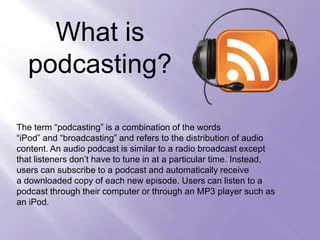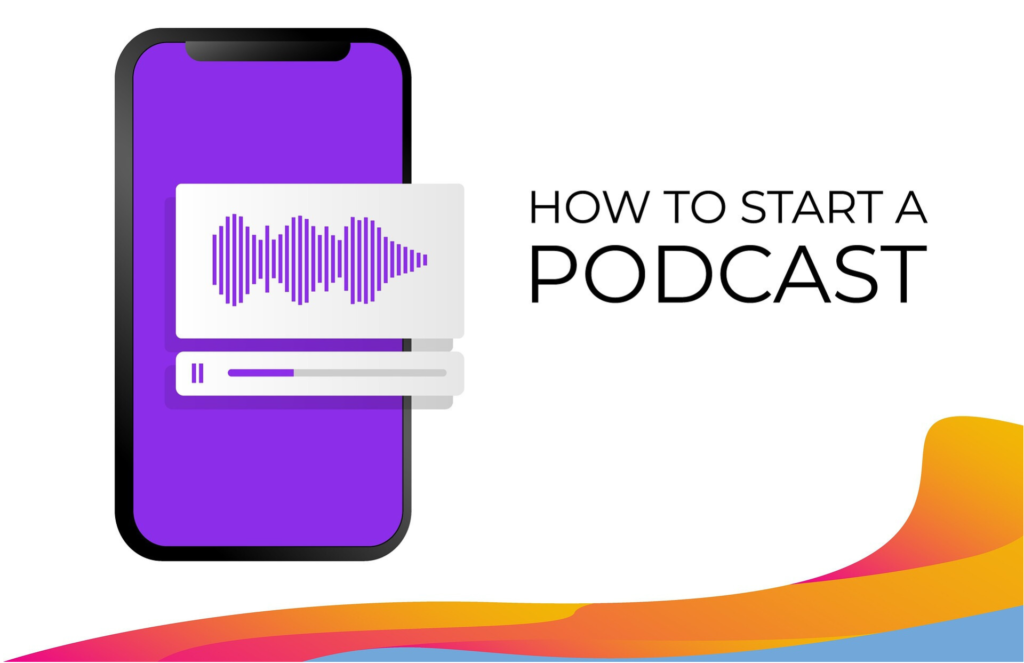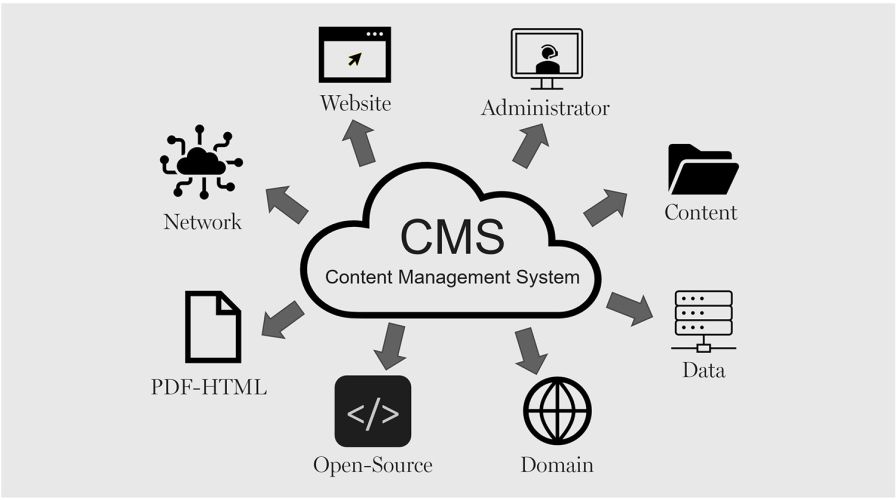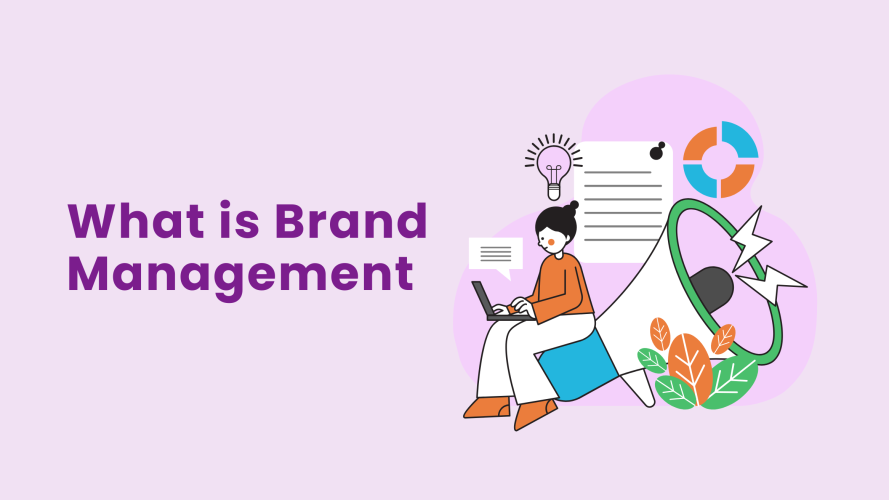INTRODUCTION
A podcast is like a digital radio show that you can listen to whenever you want. They are typically episodic, which is released in a series of individual episodes. They are created by podcasters who record the audio (and sometimes video) and share it through podcast hosting services. These services allow users to subscribe to the podcast and automatically download or stream new episodes. There are podcasts on almost every topic you can imagine, so you’re sure to find some that interest you.
Podcasts are essentially on-demand radio shows you can download or stream online. They are like downloadable audio series that cover a wide range of topics. There are millions of podcasts available, so you’re sure to find one that interests you, whether it’s true crime, comedy, history, or anything else you can imagine.
Podcasts are booming! They have grown significantly in recent years from a niche hobby to a mainstream source of entertainment and information.
What is Podcast?

A podcast is a series of spoken word audio episodes, similar to a radio show. But unlike radio, they are delivered over the Internet, so you can listen to them on your own schedule whenever you want. Here’s a breakdown:
- Audio Episodes: They are primarily audio, like listening to the radio.
- Series Format: They come in seasons and episodes like your favorite TV show.
- On-Demand: You choose when and where you listen. Download them to your phone or listen through a podcast app.
- Wide Variety: There are podcasts on almost any topic imaginable, from sports and news to true crime and comedy.
Podcasts are used for various purposes, offering advantages and disadvantages for both listeners and creators. Here’s a breakdown:
Uses and Purposes:
- Entertainment: They can be hilarious, dramatic, informative, or thought-provoking. They can be a great way to pass the time and learn new things while commuting, exercising, or doing chores.
- Education: They can dive deeply into specific topics or current events. They offer a unique blend of long-form content and an engaging format.
- Marketing: Businesses can use podcasts to connect with their target audience, build brand awareness, and establish themselves as thought leaders.
Advantages (Pros):
- On-Demand Listening: Listen whenever you want, wherever you are.
- Wide Variety: There’s a podcast for almost any interest.
- Convenience: Multitask while you listen – perfect for commutes or chores.
- In-Depth Exploration: They allow for deeper dives into topics than short news bites.
- Building Communities: They can foster a sense of community among listeners with shared interests.
- Business Promotion: They can be a powerful marketing tool for businesses.
Disadvantages (Cons):
- Time Commitment: Episodes can be lengthy, requiring a time investment.
- Limited Interaction: Unlike other forms of media, podcasts are one-directional (unless you participate in listener discussions).
- Production Quality Variation: Production quality can vary greatly between them.
- Information Overload: With so many podcasts, it can be overwhelming to find good ones.
Business Promotion with Podcasts:
- Targeted Audience: Reach a specific demographic or niche with content relevant to their interests.
- Brand Building: can establish your brand as an authority in your field.
- Thought Leadership: Showcase your expertise and insights in a conversational and engaging way.
- Customer Engagement: Build stronger relationships with your target audience.
- Content Marketing: Podcasts can be repurposed into other forms of content, like blog posts or social media snippets.

Launching a podcast can be a fun and rewarding experience! Here’s a breakdown of the steps to get you started:
Concept and Planning:
- Find Your Niche: Brainstorm topics you’re passionate about and have knowledge in. Consider your target audience and what would interest them.
- Choose Your Format: Will it be solo, co-hosted, interview-based, or narrative?
- Plan Your Episodes: Brainstorm episode ideas and outline talking points to keep things focused.
Production:
- Gear Up: You can start with basic equipment like a computer mic and invest in better mics or headphones as your podcast grows.
- Software Savvy: Choose recording and editing software. Free options are available, but paid ones might offer more features.
- Record Your First Episode: Do a practice run to get comfortable with the equipment and format.
Launch and Promotion:
- Find a Host: This service stores your audio files and distributes them to podcast directories like Apple Podcasts and Spotify.
- Brand It Up: Design eye-catching cover art and write a compelling podcast description.
- Spread the Word: Promote your podcast on social media and relevant online communities, as well as by collaborating with other podcasters.
Keep Going:
- Analyze and Adapt: Track your audience and adjust your content strategy based on their preferences.
Podcast PR vs Traditional PR
Both Podcast PR and Traditional PR share the same core objective: cultivating a positive public image and boosting brand awareness. However, they achieve this goal through different channels and approaches.
Differences:
- Media Channels: Traditional PR focuses on securing placements in established media outlets like newspapers, magazines, and television broadcasts. Podcast PR targets interviews that are relevant to reaching a specific listener base.
- Target Audience: Traditional PR often reaches a broader audience that might not perfectly align with your brand’s target market. Podcast PR allows for a more targeted approach, going after shows with listeners who are already interested in your niche.
- Content Format: Traditional PR relies on press releases, conferences, and written content. Podcast PR leverages conversation and storytelling through interviews.
- Measurability: Tracking the success of traditional PR campaigns can be more challenging. Podcast PR metrics can include download numbers, listener engagement, and website traffic driven by the podcast episode.
Similarities:
- Building Relationships: Both require strong relationships with journalists, producers, and podcast hosts. Trust and rapport are essential for securing placements.
- Crafting a Narrative: Both traditional and podcast PR involves crafting a compelling story about your brand to capture media attention.
- Generating Credibility: Earning media coverage in any form, whether traditional or through podcasts, lends credibility and trustworthiness to your brand.
- Campaign Goals: Ultimately, both types of PR aim to achieve similar goals, such as increased brand awareness, thought leadership positioning, and driving website traffic or sales.
Traditional PR and podcasts both aim to get your message out, but podcasts offer some unique advantages that have driven their rise in popularity:
- More engaging format: Podcasts are audio-based, allowing for a more conversational and personable tone than press releases or pitches. Listeners feel like they’re part of a discussion rather than being bombarded with information https://se10.com/why-podcasts-are-the-perfect-medium-for-pr/.
- Deeper dives: Podcasts offer extended airtime compared to a short news segment. This allows for a more nuanced exploration of topics and the chance to establish yourself as an authority in your field https://www.lemonpie.fm/resource/what-is-podcast-pr.
- Targeted reach: Podcasts often cater to specific niches. By appearing on a relevant podcast, you reach a highly engaged audience already interested in your area of expertise: https://www.lemonpie.fm/resource/what-is-podcast-pr.
- On-demand convenience: People can listen to podcasts whenever and wherever it’s convenient, fitting them into their daily routines. Traditional PR materials often require catching a specific broadcast or grabbing a physical copy https://www.meltwater.com/en/blog/pr-podcasts.
- Long shelf life: Podcasts aren’t fleeting like news stories. They remain available online, allowing new listeners to discover them even after the initial broadcast (https://www.lemonpie.fm/resource/what-is-podcast-pr).
While traditional PR is still important, podcasts offer a dynamic and targeted way to connect with your audience, fostering deeper connections and establishing thought leadership.
Conclusion
Podcasts offer a flexible and informative way to connect with audiences and provide value. They offer a unique and engaging way to learn and be entertained. With their growing popularity and accessibility, they’re sure to be a major source of audio content for years to come. They can be a powerful tool for both personal learning and business promotion. Podcast PR offers a more targeted and measurable approach to reaching a specific audience through engaging conversations. Traditional PR provides a broader reach but might not be as laser-focused on your ideal customer. The best approach might involve a combination of both, depending on your specific goals and target market.




